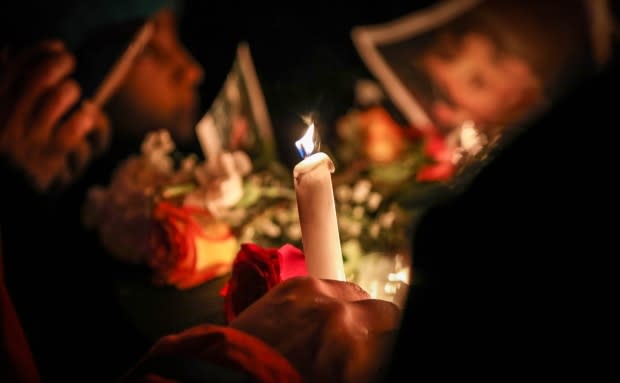TSB chair calls on Iran to take swift action on Flight PS752's black boxes
Transportation Safety Board Chair Kathy Fox said today Iran needs to take action soon and make arrangements to analyze the black boxes from the crash of Ukraine International Airlines Flight PS752 that killed 176 people.
"I think we're getting close to the end of what would be considered a reasonable period," Fox told CBC News regarding the flight recorders. "There's obviously a lot of interest in what's on them. I think they need to take action sooner rather than later, given that we're already more than just two weeks past the time of the accident."
Iran admitted it "mistakenly" shot down the jet on Jan. 8 over the capital Tehran, just hours after Iran's forces fired missiles at Iraqi bases where U.S. troops were stationed. The attack was in retaliation for the U.S. killing a high-ranking Iranian military general. Of those who died in the crash, 57 were Canadian citizens and 29 were permanent residents.
It's been more than two weeks since investigators started sifting through the wreckage of the airliner. But Iran still hasn't said where and when the plane's recorders will be downloaded and analyzed — a key piece of the puzzle in the search for answers, said Fox. Iran has asked Canada to help with the analysis of the flight recorders and two experienced TSB specialists are on standby to deploy.
"The issue here is we don't know if the data has been damaged," said Fox. "I think the Iranians still prefer, if they can, to download the recorders in Iran. But if they're not able to, they wanted to assess the capability of the lab in Kyiv."
International conventions discourage delays
The plane's aircraft flight data and cockpit voice recorders are still in Iran, said the TSB. Fox said it's understandable that Iran would want to hang on to the recorders, since it's leading the investigation and the crash happened on it's territory. But if Iran doesn't have the capacity to analyze the black boxes, the International Civil Aviation Organization's (ICAO) rules say they have to send them to someone who does.
"Under ICAO they're supposed to dispatch those recorders under their custody and control to another state who can do it without delay," she said.
Iran has granted Canada more access to the investigation than required under international aviation conventions. But Prime Minister Justin Trudeau and the TSB are pushing for a higher level of accreditation to allow Canada to participate in all aspects of the investigation, to ensure the process is thorough and transparent.
Fox said that Iran is not sharing everything with the TSB about the case, but it is sharing "a lot more information" than it's technically required to deliver.
"They've been very collaborative and cooperative in sharing the information that they can," she said.
Common for other countries to help
Two TSB investigators travelled to Tehran after the crash and spent six days on the ground visiting the crash site, inspecting the wreckage and meeting with Iranian officials. This week, the TSB team spent two days in Kyiv for joint meetings with Ukrainian and Iranian investigators that included Iran assessing Ukraine's facility to analyze the plane's recorders.

Fox said those two TSB investigators are headed back to Canada soon with details. But the TSB is only allowed to release information that Iran approves.
It's not unusual for countries that don't have the facilities to analyze black boxes to send the recorders abroad. After the shooting down of Malaysia Airlines Flight 17 in 2014, the Dutch Safety Board conducted the investigation but the black boxes were analyzed in the United Kingdom. After a deadly crash involving an Ethiopian Airlines flight in March 2019, the recorders were downloaded in France.
"That's very common practice," said Fox.
Sophisticated labs involved
Fox said investigators need a lab with sophisticated computers to analyze the recorders, which are roughly the size of bread boxes. When the aircraft flight data or cockpit voice recorders are damaged, the lab may need additional equipment. The U.S.-based electronics firm Honeywell, in this case, made the parts for the recorders, said Fox.
Fox said that, according to the international rules, the crash probe will not lay blame. The black boxes can tell investigators what the plane's crew members were saying, if they had advance warning of the missile strike and what the aircraft was doing before and after the missiles exploded, said Fox.
"That's important," she said. "Then you put that data together with the wreckage informational and that will give you a much better idea of what was going on."

